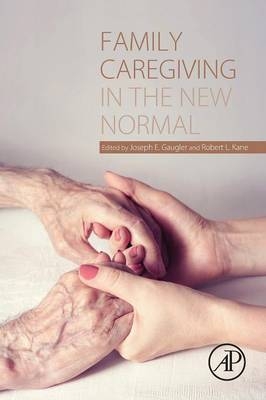
Family Caregiving in the New Normal
Academic Press Inc (Verlag)
978-0-12-417046-9 (ISBN)
This text summarizes the challenges and potential solutions scientists, policy makers, and clinical providers must address as they grapple with these changes, with a primary focus given to the elements that may impact how family caregiving is organized and addressed in subsequent decades, including sociodemographic trends like divorce, increased participation of women in the workforce, geographic mobility, fewer children in post-baby boom families, chronic illness trends, economic stressors, and the current policy environment.
A section on the support of caregivers includes technology-based solutions that examine existing models, personal health records, and mobile applications, big data issues, decision-making support, person-centered approaches, crowd-sourced caregiving such as blogs and personal websites that have galvanized caregivers, and new methods to combine paid and unpaid forms of care.
Joseph E. Gaugler, PhD is a Professor in the School of Nursing and Center on Aging at The University of Minnesota.". Dr. Gaugler's research examines the sources and effectiveness of long-term care for chronically disabled older adults. A developmental psychologist with an interdisciplinary research focus, Dr. Gaugler's interests include Alzheimer's disease and long-term care, the longitudinal ramifications of family care for disabled adults, and the effectiveness of community-based and psychosocial services for chronically ill adults and their caregiving families. Underpinning these substantive areas, Dr. Gaugler also has interests in longitudinal and mixed methods.Dr. Gaugler currently serves as Editor-in-Chief for the Journal of Applied Gerontology and on the editorial boards of Journals of Gerontology: Psychological Sciences, Journals of Gerontology: Social Sciences, and Psychology and Aging. He was awarded the 2003 Springer Early Career Achievement Award in Adult Development and Aging Research, the 2011 M. Powell Lawton Distinguished Contribution Award for Applied Gerontology from the American Psychological Association (Division 20: Adult Development and Aging), the 2011 Dean's Award from the University of Minnesota School of Nursing, and the 2015 Gordon Streib Distinguished Academic Gerontologist Award from the Southern Gerontological Society. He is a Fellow of the Gerontological Society of America and the American Psychological Association. Robert L. Kane, MD, holds an endowed chair in Long-term Care and Aging at the University of Minnesota School of Public Health, where he was formerly the Dean. He directs the University of Minnesota's Center on Aging, the Minnesota Area Geriatric Education Center, the Clinical Outcomes Research Center, and an AHRQ-funded Evidence-based Practice Center. He has conducted numerous research studies on both the clinical care and the organization of care for older persons, especially those needing long-term care. He is the author or editor of 34 books and more than 500 journal articles and book chapters on geriatrics and health services research. He has analyzed long-term systems both in this country and abroad. Recent books include The Heart of Long-term Care, Assessing Older Persons, the 7th edition of Essentials of Clinical Geriatrics, Conducting Health Care Outcomes Research, and Meeting the Challenge of Chronic Illness. He and his sister, Joan West, have written an account of the struggles to get adequate long-term care for their mother, It Shouldn’t Be This Way. That experience led to his founding a national organization dedicated to improving long-term care, Professionals with Personal Experience with Chronic Care (PPECC), which has over 800 members. He recently wrote a book specifically to help caregivers of older persons, The Good Caregiver. He is a graduate of Harvard Medical School. His current research addresses both acute and long-term care for older persons, with special attention to the role of managed care, chronic disease, and disability, as well as systematic reviews of the literature on various topics. Dr. Kane has consulted to a number of national and international agencies, including the World Health Organization's Expert Committee on Aging. He has received the President’s Award from the American Society on Aging and the Polisher Award from the Gerontological Society of America, the Enrico Greppi Prize from the Italian Society of Gerontology and Geriatrics, and the British Geriatrics Society Medal for the Relief of Suffering amongst the Aged. He was elected to the University of Minnesota’s Academic Health Center’s Academy for Excellence in Health Research.
Foreword
Alan B. Stevens and Rachael Watman
1. Introduction: Family Caregiving in the New Normal
Joseph E. Gaugler and Robert L. Kane
Section I: Personal Perspectives: Caregiving in the New Normal
2. Caregiving Roles Reversed: Becoming My Mother’s Mother
Michele H. Kimball
3. Complexity and Opportunities in Caregiving: A Story of Holding On and Letting Go
Christine W. Hartmann
4. Caregiver Woes in the Medicare System: A Tale of Two Patients
Jerald Winakur
5. The Caregiving Crucible: Crisis and Opportunity
Emily Kearns
Section II: Threats to Family Caregiving in the United States
6. Factors Affecting the Future of Family Caregiving in the United States
Robyn I. Stone
7. Chronic Illness Trends and the Challenges to Family Caregivers: Organizational and Health System Barriers
Jennifer L. Wolff and Barry J. Jacobs
8. Informal Care and Economic Stressors
Courtney Harold Van Houtven
Section III: Policy Considerations and Family Caregiving
9. The Policy and Political Environment of Family Caregiving: A Glass Half Full
Debra J. Lipson
10. Help for Family Caregivers Available from Government Programs and Policies
Pamela Doty and Brenda Spillman
Section IV: A New Vision for Supporting Caregivers in the Future
11. Translational Research on Caregiving: Missing Links in the Translation Process
Elaine Wethington and Louis D. Burgio
12. Information Technology to Support Aging: Implications for Caregiving
George Demiris
13. Supporting Caregivers of Older Adults in Making Decisions: Current Tools and Future Directions
Tetyana P. Shippee, Kathleen Rowan and Carrie Henning-Smith
14. Person-Centered Approaches to Caregiving
Karen I. Connor, Hilary C. Siebens and Joshua Chodosh
15. The Impact of the Internet and Social Media on Caregiving
Katherina Nikzad-Terhune, Keith A. Anderson and Lori La Bey
16. The Escalating Complexity of Family Caregiving: Meeting the Challenge
Susan C. Reinhard and Lynn Friss Feinberg
17. Caregivers as Therapeutic Agents in Dementia Care: The Context of Caregiving and the Evidence Base for Interventions
Laura N. Gitlin and Nancy Hodgson
Conclusion
18. A Perfect Storm? The Future of Family Caregiving
Joseph E. Gaugler and Robert L. Kane
| Verlagsort | San Diego |
|---|---|
| Sprache | englisch |
| Maße | 152 x 229 mm |
| Gewicht | 520 g |
| Themenwelt | Sachbuch/Ratgeber ► Gesundheit / Leben / Psychologie |
| Geisteswissenschaften ► Psychologie | |
| Sozialwissenschaften ► Pädagogik ► Sozialpädagogik | |
| Sozialwissenschaften ► Soziologie | |
| ISBN-10 | 0-12-417046-3 / 0124170463 |
| ISBN-13 | 978-0-12-417046-9 / 9780124170469 |
| Zustand | Neuware |
| Haben Sie eine Frage zum Produkt? |
aus dem Bereich


